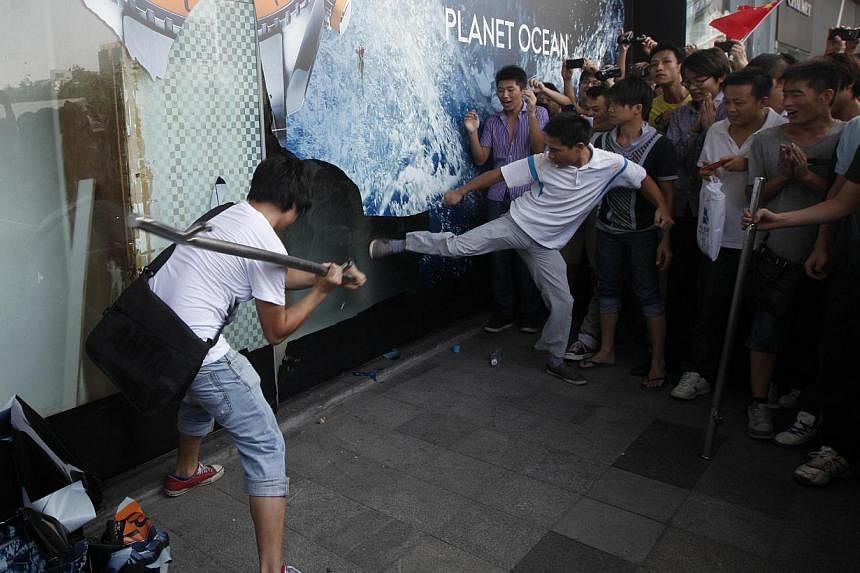A cluster of scraggy outcrops in the East China Sea are witnesses on some days to hostile confrontation between ships belonging to the Japanese and Chinese Coast Guards respectively.
The Pinnacle Isles, as they were named by English seamen in the 18th century, are the lonely reminders of a long-simmering territorial dispute between Japan and China that has negatively affected bilateral relations in recent years.
These days, the islands are more widely known by their Japanese name Senkaku (Japanese for "pinnacle") or by their Chinese appellation Diaoyu (Chinese for "fishing").
The fight over the ownership of the Senkakus, which are located near key shipping routes, rich fishing grounds and likely undersea oil deposits, has marred Japan's ties with its colossal neighbour.
Bilateral ties plunged to their lowest in September 2012 after Japan nationalised several of the islands, precipitating large-scale protests in many Chinese cities.
Chinese ships have since been making regular incursions into the waters around the islands and Chinese planes have intruded into Senkaku air space.
China wants to keep the spat alive, insisting that it will not come to the negotiating table with Japan unless Tokyo acknowledges the dispute.
Japan, however, maintains there is none.
The Senkakus were said have been used by the Chinese as navigational markers in the 15th century.
But Japan annexed the islands in 1895 after a survey found no claims to them and has continued to control the islands, except from 1945-1972 when they were administered by occupying US forces.
Despite strident official rhetoric from Beijing, the squabble over the Senkakus seems to be enjoying a respite in recent weeks, with both sides working hard to prevent the situation from getting out of hand.
They are well aware of the consequences of any armed clashes over the islands, premeditated or otherwise.
Of late, China has shown interest in enhancing economic ties with Japan - their trade ministers met in Qingdao on May16 - while blaming Japan for the state of relations.
Putting to rest any ambiguity in Washington's role in the event of a conflict, President Barack Obama declared last month (April), during a visit to Tokyo, that the United States will go to the aid of Japan should there be any attacks on the Senkakus.
The Senkakus fall under "territories administered by Tokyo", which the US is obliged to protect under its security treaty with Japan.
At the same time, this definition allows Washington to sidestep the issue of whether the islands rightfully belong to Japan or not.
The US could conceivably also assist Japan from one of the bases in the Philippines now being considered under Washington's new 10-year defence agreement with Manila.
While showing support, Mr Obama also told Japanese Prime Minister Shinzo Abe that he expects him to work to resolve the Senkaku issue peacefully, keep the rhetoric low and not escalate the situation.
The US, said Mr Obama, has "strong relations with China", which he described as "a critical country not just to the region but to the world".
Despite Mr Obama's pledge of a "rebalancing" towards Asia, both Tokyo and Beijing no doubt suspect that the US is not eager to involve itself in a war over the Senkakus, particularly after seeing Washington's about-turn in the Syrian crisis and its failure to prevent Russia's annexation of Crimea.
Meanwhile, Japan is beefing up the defence of its southwestern flank with three new military outposts to protect its outlying islands, including the Senkakus.
In the early 1970s, first the Chinese, then the Taiwanese, started to lay claim to the islands, following the discovery of fossil fuel deposits by a 1968 United Nations hydrographic survey.
Chinese authorities use historical documents to back up their claim.
But Japanese experts say that what matters under international law is whether the Qing Dynasty had established effective control of the Senkakus prior to Japan's annexation.
In a Dec 2013 op-ed at the jurist.org online site, Professor Michael Kelly of Creighton University suggests that Chinese leader Xi Jinping's real focus is not on the East China Sea but the South China Sea where China has overlapping claims with Vietnam, Malaysia and the Philippines to several clusters of islands, ownership of which would give Beijing control over huge oil deposits in the area.
Prof Kelly wrote: "His strategy is to create the biggest fuss possible with brinksmanship tactics over the Senkaku Islands in order to bring a frayed and twitchy Japan to the bargaining table, with the US nervously in the background pushing hard for peace."
"In exchange for relinquishing China's claim to the Senkakus, Mr Xi would want Japan to support China's claim to the South China Sea."
The expert on international and comparative law says China is seeking a "grand bargain".
"Politically, the Japanese government comes home with a huge victory that costs it virtually nothing. But of course, what Japan gives China in this grand bargain is far more valuable to China than a handful of rocks near Okinawa," he said.
"With Japan backing its claim in the South China Sea and the US backing off, China will be in a position to deal bilaterally with the claims of the smaller states," he added.
Fanciful thinking?
Not half as fanciful as China's present claim to almost the entire South and East China Seas.

